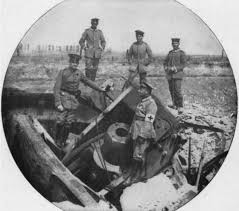Brussels can’t hold out; a humiliation for Vienna
Plotting jihad in Berlin
Special to The Great War Project
(18-19 August) Brussels, the Belgian capital, is threatened, and the Belgian government decides to move its operations north to the port city of Antwerp.

German soldiers inspect Belgian artillery destroyed by retreating Belgian troops, on the road to Brussels, August 1914
Hugh Gibson, an American diplomat in Brussels, writes in his diary on 19 August a century ago, “Crowds of people are pouring in from the east in all stages of panic and some small forces of cavalry have also retreated into the city.”
“There has evidently been a rout.”
The German army is pushing deep into Belgian territory, and the Belgians are suffering considerable losses – more than 1600 killed or wounded in the defense of one town alone on the road to Brussels.
This is the fourth day in the French army’s Lorraine offensive, an effort to take back the territories it lost to the Germans more than forty years earlier. In four days, the French gain ground; the Germans fall back.
But on 18 August the Germans dig in. They are about to counter-attack.
In Serbia, the Austrians are facing a fierce Serb counter-offensive. On 19 August the Austrians retreat. It is a rout. The Austrian army withdraws from Serbian territory.
History Martin Gilbert calls it “the first victory of the Entente powers.” Austria-Hungary claims its withdrawal from Serbia is necessary to concentrate operations against Russia.
Gilbert calls the Austrian withdrawal “costly:” 6000 Austrian soldiers dead, 30,000 wounded, 4,000 soldiers taken prisoner.
Serb losses are half that but still considerable: 3,000 dead, 15,000 wounded.
The Austrian defeat in Serbia is not insignificant. Soon all of Europe will know how the small nation of Serbia brought Austria-Hungary to its knees.
According to historians, the defeat brings with it a crisis of confidence in Vienna. Many are asking the crucial question: if we cannot defeat the Serbs, what can we expect when we face the Russians?
Meanwhile the Germans are hatching other plots far from the European fronts.
On 18 August a century ago, Baron Max von Oppenheim, a self-styled covert German agent in the Muslim world, writes to the German chancellor in Berlin. Oppenheim’s mission? To launch Islamic jihad against the British in India and all throughout the Muslim world.
Arm the Muslim Brotherhood in Libya, Sudan, and Yemen, Oppenheim urges.
According to historian Sean McMeekin, Oppenheim tells the German chancellor, Germany must persuade the Emir of Afghanistan to lead an Islamic army in an invasion of British India.

